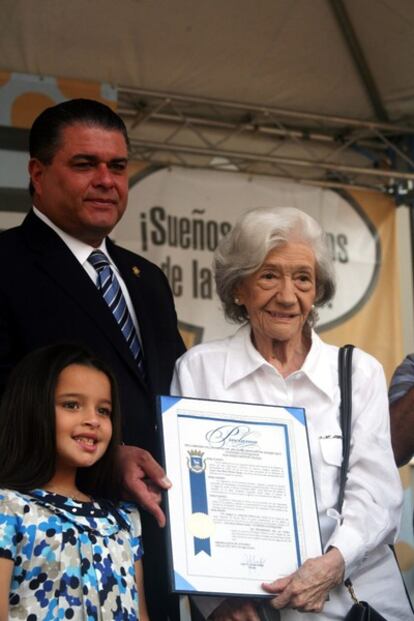Spanish on the English frontier
Puerto Rico leg of traveling festival explores the links between two literary worlds
The Santa María Magdalena cemetery, built in 1863 on a cliff in Puerto Rico, is a resplendent location, which invites you to lie down there for eternity and listen to the sound of the ocean. Just a few meters from this cemetery, where the waves also die, there is a festival that shares the soul of a cliff. Or of a border, as the Peruvian writer Fernando Iwasaki would say.
A literary festival is a strange place. People who live to create fables meet at all hours of the day to talk about all manner of things. Added to that is the fact that this festival takes place in the Caribbean, where, as the journalist who uncovered the artistic plundering of the Nazis, Héctor Feliciano, says, "100 years of solitude are lived every day."
The event is a two-headed festival, suitable for a divided country
"A lot of people still don't understand that we are part of Iberoamerica"
During the five days of this edition of the II Festival de la Palabra (or, Festival of the Word), whose first stage has just drawn to a close, astonishing things took place. With the excuse of a photo opportunity, the only two Latinos with a Pulitzer Prize on their mantelpieces met for the first time: Óscar Hijuelos (The Mambo Kings, 1990) and Junot Díaz (The Brief Wondrous Life of Oscar Wao, 2008) hugged one another on Saturday at a meeting that was as historic as it was fleeting.
Hijuelos told the public of a paradox. "In my first novel, I wrote about events from my childhood, and there was realism," he said. "Ironically, I've now written my memoirs and I have had to make things up, because I don't remember."
Díaz, an obsessive perfectionist, also had a confession. "I am still suffering just the same, like a blockhead. I know it's not worth it - I'm 42 and I don't know why I suffer this dictatorship. I hope that when I'm 50 I can be freed, but right now I'm going through the same hell." The writer was referring to the tortuous 11 years between his first book, Drown (1997) and The Brief Wondrous Life of Oscar Wao. "I am in that stage, like being lost in the desert, where I don't know where I'm going but I know that I have to get somewhere."
Continuing the magic, the Chilean Arturo Fontaine and Guatemalan David Unger were reunited after 17 years. While they ate together, the pair discussed the era of wild partying in New York before the outbreak of conservative morality that accompanied the arrival of AIDS, and the singular descent into hell of the homosexual writer Manuel Puig. Fontaine has just been given the first Las Américas award for La vida doble (or, The double life), chosen by a group of colleagues as 2010's best Spanish-language novel.
An 85-year-old gnome named Ana María Matute flew across the ocean to seduce the Caribbeans. The writer who recently won the Cervantes Prize in her native Spain told jokes and signed books for Puerto Ricans who had grown up reading her works. Matute, a friend of writer José Manuel Fajardo, the director of the event's program, accepted the invitation to travel to Puerto Rico and then New York, where the festival will continue this week.
It's a two-headed festival, for a divided country. Puerto Rico has as many inhabitants in New York as it does in the island. The flight of Puerto Ricans to the United States had two effects: it spread the Spanish language to a country that is fighting against being bilingual, and worsened the identity crises of Puerto Rico, a free state that is perceived by practically everyone as a colony. There are still a lot of people in Iberoamerica who don't understand that we are part of Iberoamerica," says the writer Mayra Santos-Febres, director of the festival. "They think that because we belong to the United States we speak English."

Tu suscripción se está usando en otro dispositivo
¿Quieres añadir otro usuario a tu suscripción?
Si continúas leyendo en este dispositivo, no se podrá leer en el otro.
FlechaTu suscripción se está usando en otro dispositivo y solo puedes acceder a EL PAÍS desde un dispositivo a la vez.
Si quieres compartir tu cuenta, cambia tu suscripción a la modalidad Premium, así podrás añadir otro usuario. Cada uno accederá con su propia cuenta de email, lo que os permitirá personalizar vuestra experiencia en EL PAÍS.
¿Tienes una suscripción de empresa? Accede aquí para contratar más cuentas.
En el caso de no saber quién está usando tu cuenta, te recomendamos cambiar tu contraseña aquí.
Si decides continuar compartiendo tu cuenta, este mensaje se mostrará en tu dispositivo y en el de la otra persona que está usando tu cuenta de forma indefinida, afectando a tu experiencia de lectura. Puedes consultar aquí los términos y condiciones de la suscripción digital.








































